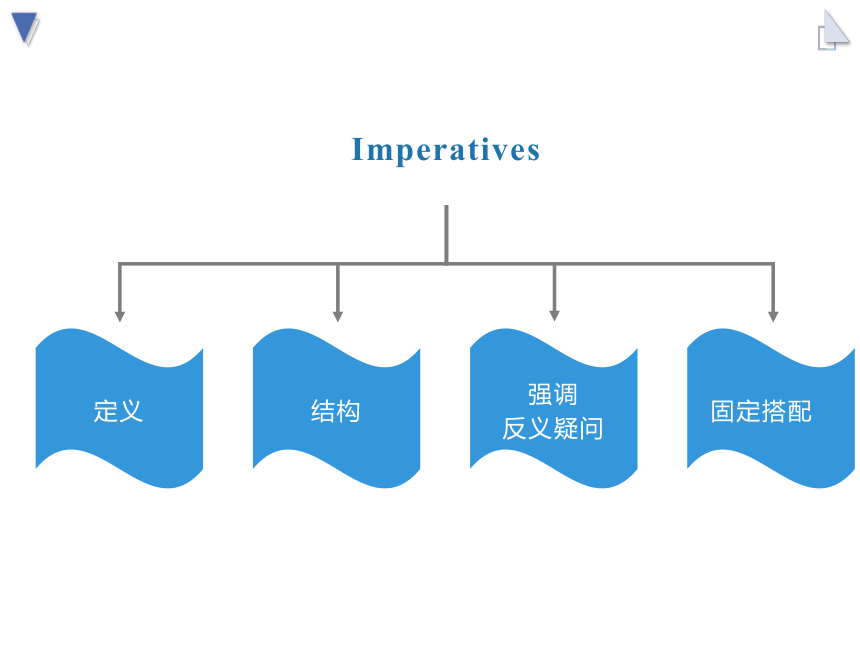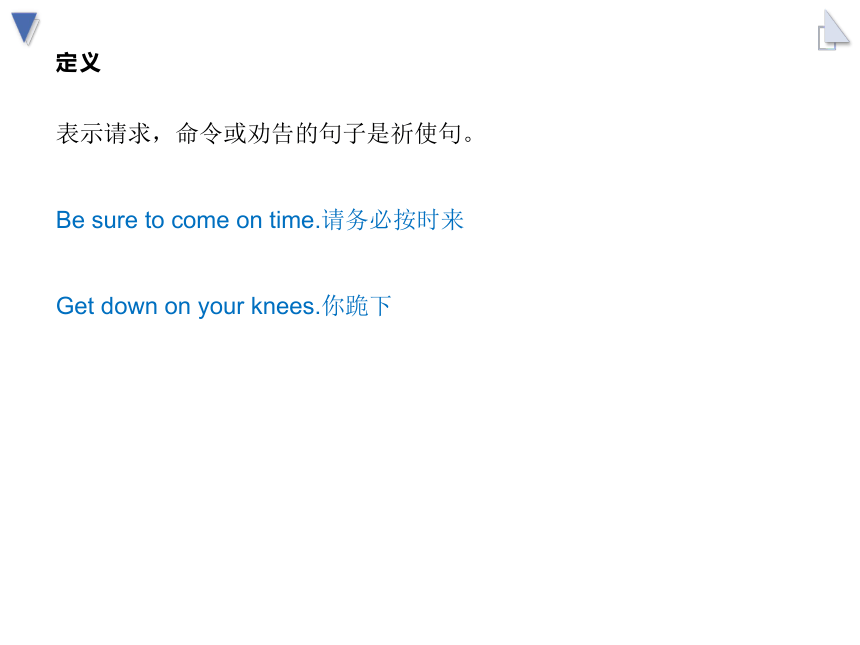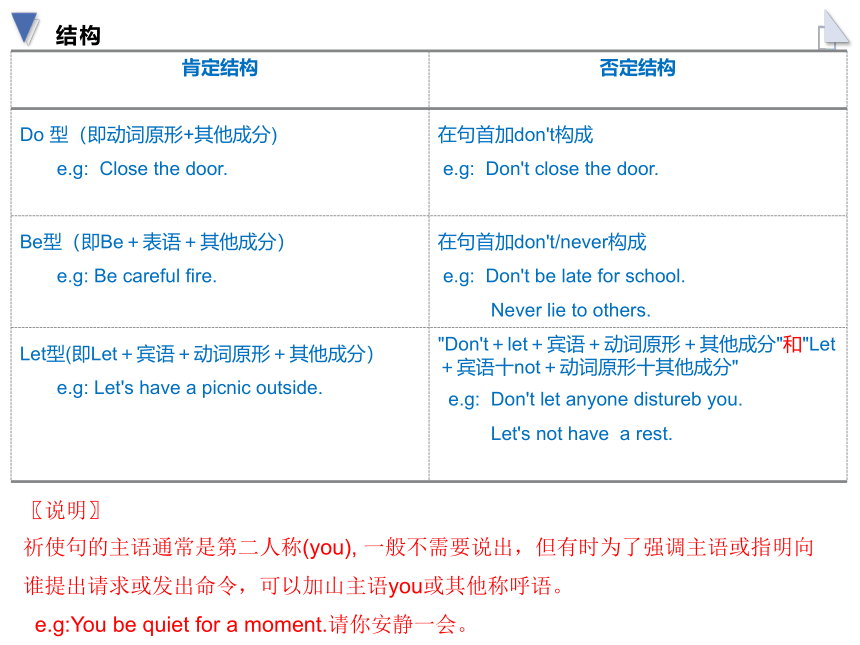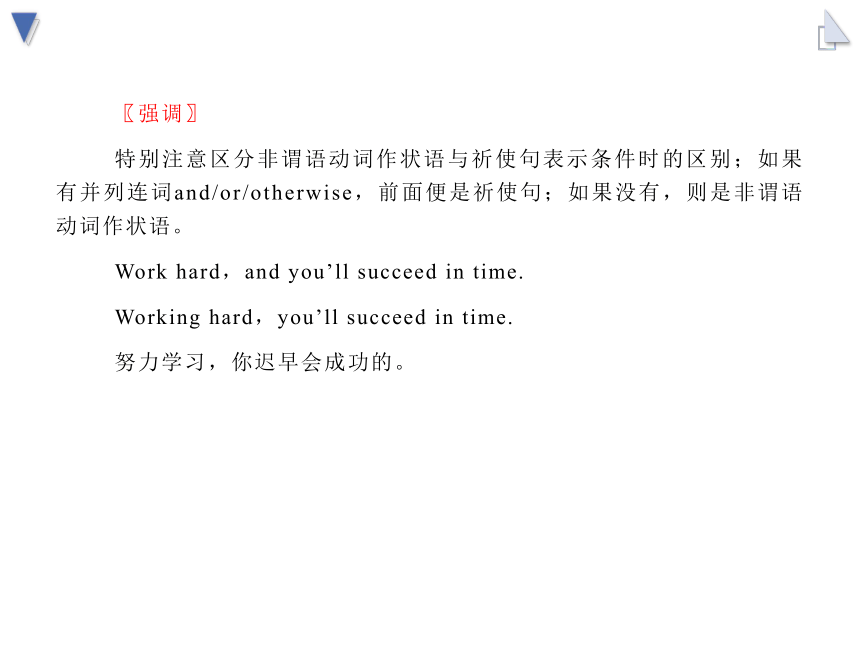外研社英语必修四Module 2 Traffic Jam grammar课件(25张PPT)
文档属性
| 名称 | 外研社英语必修四Module 2 Traffic Jam grammar课件(25张PPT) |  | |
| 格式 | zip | ||
| 文件大小 | 1.3MB | ||
| 资源类型 | 教案 | ||
| 版本资源 | 外研版 | ||
| 科目 | 英语 | ||
| 更新时间 | 2020-05-17 09:34:23 | ||
图片预览









文档简介
(共25张PPT)
Lena王
Imperatives
祈使句
Imperatives
定义
结构
强调
反义疑问
固定搭配
定义
表示请求,命令或劝告的句子是祈使句。
Be sure to come on time.请务必按时来
Get down on your knees.你跪下
结构
〖说明〗
祈使句的主语通常是第二人称(you), 一般不需要说出,但有时为了强调主语或指明向谁提出请求或发出命令,可以加山主语you或其他称呼语。
e.g:You be quiet for a moment.请你安静一会。
肯定结构 否定结构
Do 型(即动词原形+其他成分)
e.g: Close the door. 在句首加don't构成
e.g: Don't close the door.
Be型(即Be+表语+其他成分)
e.g: Be careful fire. 在句首加don't/never构成
e.g: Don't be late for school.
Never lie to others.
Let型(即Let+宾语+动词原形+其他成分)
e.g: Let's have a picnic outside. "Don't+let+宾语+动词原形+其他成分"和"Let+宾语十not+动词原形十其他成分"
e.g: Don't let anyone distureb you.
Let's not have a rest.
强调,反义疑问句
〖强调〗
1.祈使句的肯定句的强调形式是在句首加 do。
e.g:Do listen to your teachers.千万要听老师的话。
2.如果在祈使句中需要强调对方时,也可表示出主语。
e.g:Tom,come here quickly. 汤姆,快点过来。
〖反义疑问句〗
祈使句的反意疑问句,通常加will you。如果祈使句是let's., 反意疑问句是shall we。回答通常用I wil/Iwon't。
e.g:Feed the dog today,will you?今天你喂狗,可以吗?
Let us have a rest, will you? 让我们休息一下,行吗?
Let's have a rest, shall we? 我们休息一下,好吗?
固定搭配
补充
1.不含动词的祈使句
Quick! 快!
No parking!不准停车!
Hands up! 举起手。
2. 使祈使语气更加婉转的方法
为了使祈使句听起来比较客气,婉转,除了用低声调外,还可加please或will you。
Please give me a hand.请帮我一下。
Read the text,will you?读一下课文好吗
口诀
祈使句无主语,主语 you常省去;
动词原形谓语当,句首加don't否定变;
朗读应当用降调,句末常标感叹号。
〖强调〗
特别注意区分非谓语动词作状语与祈使句表示条件时的区别;如果有并列连词and/or/otherwise,前面便是祈使句;如果没有,则是非谓语动词作状语。
Work hard,and you’ll succeed in time.
Working hard,you’ll succeed in time.
努力学习,你迟早会成功的。
1. (2013·安溪高一检测)Use your head, ______you’ll work out the problem.
A. or B. so C. and D. for
【解析】选C。考查“祈使句+ and/ or+ 简单句”。句意:动动脑筋,然后你就会解决这个问题。and表示前后之间是顺承关系。根据句意可知选C项。
2. (2013·吉林高一检测)—______go out for a picnic with us this afternoon?
— I’d like to, but I’ll be busy preparing for the test.
A. Do you feel like B. Would you like
C. Why not D. What about
【解析】选C。考查特殊句式结构。句意:——今天下午为什么不和我们一起去野餐呢?——我非常乐意,但是我忙着准备考试呢。Why not/Why don’t you +动词原形?为什么不……呢?是表示建议的一种方式。Do you feel like doing sth. ?和Would you like to do sth. ?表示“你愿意……吗?”而What about doing sth. ?也是表示建议的方式。根据空后的动词原形可知选C项。
3. ______your children to try new things, but try not to push them too hard.
A. Encouraging B. Don’t encourage
C. Encourage D. Not encouraging
【解析】选C。句意:鼓励你的孩子去尝试新事物,但不要对他们太苛刻。根据句中的but可知,but前面应该是一个句子,然后再根据but后面的祈使句可知,此处应该是一个祈使句。由此可知选C。
4. (2013·杭州高一检测)—Sorry for being late for the lecture, Mr. Blackmail.
—______earlier next time,will you?
A. Coming B. To come
C. Having come D. Come
【解析】选D。考查祈使句。句意:——很抱歉我来晚了,Blackmail先生。——下次早来会儿,好吗?根据句意可知答语是一个句子,再依据反意疑问句是will you可知前面是一个祈使句。故选D项。
5. Take the flowers into a warm room, ______they will die quickly.
A. and B. so C. or D. but
【解析】选C。考查祈使句。句意:把花搬进一间温暖的屋子,否则的话它们很快就会死的。and表示前后之间是顺承关系;or表示前后之间是转折关系。根据句意可知选C项。
6. ______your doctor’s advice, or your cough will get worse.
A. Don’t follow B. Do follow
C. Following D. To follow
【解析】选B。句意:一定要听从医生的建议,否则你的咳嗽会更严重。根据句中的or可知此处考查“祈使句+and/or+简单句”结构。由此可知选B。此处do表示强调。
【知识拓展】do (does, did)表示强调
do (does, did)表示强调时,根据需要翻译成“务必、一定、真的、确实”等。
1. do放在祈使句的句首,表示请求,有时可以使邀请的口气更热情、客气和友好。例如:
Do have another cup of coffee.
请再喝杯咖啡。
2. do (does, did)放在肯定句中,后面接动词原形,表示强调。例如:
I did think you were the best student in our class.
我当时的确认为你是我们班最好的学生。
He does like to eat noodles.
他真的喜欢吃面条。
It’s true that Americans do eat those things.
美国人确实吃那些东西,这是真的。
7. ______ some of this juice — perhaps you will like it.
A. Trying B. Try
C. To try D. Have tried
【解析】选B。考查祈使句。句意:尝点果汁——或许你会喜欢的。破折号后的句子对前面的句子起补充、说明的作用。破折号前是一个句子,故选择祈使句。A、C选项是非谓语动词形式,D项为完成时态,显然和无主语的句子结构不符合。
8. —Call me when you get home.
—______.
A. I must B. I should C. I will D. I can
【解析】选C。对祈使句进行回答时,用I will或者I won’t。
9. —Where is my purse?
— ______ ! We’ll be late for the picnic.
A. Take your time B. Don’t worry
C. Come on D. Take it easy
【解析】选C。考查交际用语。句意:——我的钱包呢?——快点吧!我们野餐要晚了。根据后半句We’ll be late for the picnic. 可知前面为表示催促的句子。Take your time别着急,慢慢来;Don’t worry别担心;Take it easy别着急;Come on快点,得了吧。根据句意可知选C项。
10. Turn on the television or open a magazine and you______ advertisements showing happy families.
A. will often see B. often see
C. are often seeing D. have often seen
【解析】选A。在“祈使句+and/or+简单句”结构中,简单句中的时态常用一般将来时。故选A。
【变式训练】
Let’s keep to the point or we ______ any decisions.
A. will never reach B. have never reached
C. never reach D. never reached
【解析】选A。根据句中的or可知此处考查“祈使句+and/or+简单句”结构。在此结构中,简单句要用一般将来时。故选A。
1.Never________(say) die and you'll succeed.
2.Don't_______(leave) the club or you will not come back.
3. The sign reads"No________(park).
4________(go) on taking exercise regularly and you__________ (lose)weight.
5.Do______(sit)there still and don't_______(make)much noise.
6.Please______(be)glad, dear. Everything will be better.
7. Let's not________(tell) her what we did.
8. If he thinks he can cheat me,just______(let)him try!
I.用所给动词的适当形式填空
1. Be sure to get here before ten,__________?
2. Don't open the window,___________?
3. Let's go on a trip to Beiing this weekend, _________?
4. Let us discuss it tomorrow,____________?
Ⅱ.写出下列祈使句的反意疑问形式
Lena王
Imperatives
祈使句
Imperatives
定义
结构
强调
反义疑问
固定搭配
定义
表示请求,命令或劝告的句子是祈使句。
Be sure to come on time.请务必按时来
Get down on your knees.你跪下
结构
〖说明〗
祈使句的主语通常是第二人称(you), 一般不需要说出,但有时为了强调主语或指明向谁提出请求或发出命令,可以加山主语you或其他称呼语。
e.g:You be quiet for a moment.请你安静一会。
肯定结构 否定结构
Do 型(即动词原形+其他成分)
e.g: Close the door. 在句首加don't构成
e.g: Don't close the door.
Be型(即Be+表语+其他成分)
e.g: Be careful fire. 在句首加don't/never构成
e.g: Don't be late for school.
Never lie to others.
Let型(即Let+宾语+动词原形+其他成分)
e.g: Let's have a picnic outside. "Don't+let+宾语+动词原形+其他成分"和"Let+宾语十not+动词原形十其他成分"
e.g: Don't let anyone distureb you.
Let's not have a rest.
强调,反义疑问句
〖强调〗
1.祈使句的肯定句的强调形式是在句首加 do。
e.g:Do listen to your teachers.千万要听老师的话。
2.如果在祈使句中需要强调对方时,也可表示出主语。
e.g:Tom,come here quickly. 汤姆,快点过来。
〖反义疑问句〗
祈使句的反意疑问句,通常加will you。如果祈使句是let's., 反意疑问句是shall we。回答通常用I wil/Iwon't。
e.g:Feed the dog today,will you?今天你喂狗,可以吗?
Let us have a rest, will you? 让我们休息一下,行吗?
Let's have a rest, shall we? 我们休息一下,好吗?
固定搭配
补充
1.不含动词的祈使句
Quick! 快!
No parking!不准停车!
Hands up! 举起手。
2. 使祈使语气更加婉转的方法
为了使祈使句听起来比较客气,婉转,除了用低声调外,还可加please或will you。
Please give me a hand.请帮我一下。
Read the text,will you?读一下课文好吗
口诀
祈使句无主语,主语 you常省去;
动词原形谓语当,句首加don't否定变;
朗读应当用降调,句末常标感叹号。
〖强调〗
特别注意区分非谓语动词作状语与祈使句表示条件时的区别;如果有并列连词and/or/otherwise,前面便是祈使句;如果没有,则是非谓语动词作状语。
Work hard,and you’ll succeed in time.
Working hard,you’ll succeed in time.
努力学习,你迟早会成功的。
1. (2013·安溪高一检测)Use your head, ______you’ll work out the problem.
A. or B. so C. and D. for
【解析】选C。考查“祈使句+ and/ or+ 简单句”。句意:动动脑筋,然后你就会解决这个问题。and表示前后之间是顺承关系。根据句意可知选C项。
2. (2013·吉林高一检测)—______go out for a picnic with us this afternoon?
— I’d like to, but I’ll be busy preparing for the test.
A. Do you feel like B. Would you like
C. Why not D. What about
【解析】选C。考查特殊句式结构。句意:——今天下午为什么不和我们一起去野餐呢?——我非常乐意,但是我忙着准备考试呢。Why not/Why don’t you +动词原形?为什么不……呢?是表示建议的一种方式。Do you feel like doing sth. ?和Would you like to do sth. ?表示“你愿意……吗?”而What about doing sth. ?也是表示建议的方式。根据空后的动词原形可知选C项。
3. ______your children to try new things, but try not to push them too hard.
A. Encouraging B. Don’t encourage
C. Encourage D. Not encouraging
【解析】选C。句意:鼓励你的孩子去尝试新事物,但不要对他们太苛刻。根据句中的but可知,but前面应该是一个句子,然后再根据but后面的祈使句可知,此处应该是一个祈使句。由此可知选C。
4. (2013·杭州高一检测)—Sorry for being late for the lecture, Mr. Blackmail.
—______earlier next time,will you?
A. Coming B. To come
C. Having come D. Come
【解析】选D。考查祈使句。句意:——很抱歉我来晚了,Blackmail先生。——下次早来会儿,好吗?根据句意可知答语是一个句子,再依据反意疑问句是will you可知前面是一个祈使句。故选D项。
5. Take the flowers into a warm room, ______they will die quickly.
A. and B. so C. or D. but
【解析】选C。考查祈使句。句意:把花搬进一间温暖的屋子,否则的话它们很快就会死的。and表示前后之间是顺承关系;or表示前后之间是转折关系。根据句意可知选C项。
6. ______your doctor’s advice, or your cough will get worse.
A. Don’t follow B. Do follow
C. Following D. To follow
【解析】选B。句意:一定要听从医生的建议,否则你的咳嗽会更严重。根据句中的or可知此处考查“祈使句+and/or+简单句”结构。由此可知选B。此处do表示强调。
【知识拓展】do (does, did)表示强调
do (does, did)表示强调时,根据需要翻译成“务必、一定、真的、确实”等。
1. do放在祈使句的句首,表示请求,有时可以使邀请的口气更热情、客气和友好。例如:
Do have another cup of coffee.
请再喝杯咖啡。
2. do (does, did)放在肯定句中,后面接动词原形,表示强调。例如:
I did think you were the best student in our class.
我当时的确认为你是我们班最好的学生。
He does like to eat noodles.
他真的喜欢吃面条。
It’s true that Americans do eat those things.
美国人确实吃那些东西,这是真的。
7. ______ some of this juice — perhaps you will like it.
A. Trying B. Try
C. To try D. Have tried
【解析】选B。考查祈使句。句意:尝点果汁——或许你会喜欢的。破折号后的句子对前面的句子起补充、说明的作用。破折号前是一个句子,故选择祈使句。A、C选项是非谓语动词形式,D项为完成时态,显然和无主语的句子结构不符合。
8. —Call me when you get home.
—______.
A. I must B. I should C. I will D. I can
【解析】选C。对祈使句进行回答时,用I will或者I won’t。
9. —Where is my purse?
— ______ ! We’ll be late for the picnic.
A. Take your time B. Don’t worry
C. Come on D. Take it easy
【解析】选C。考查交际用语。句意:——我的钱包呢?——快点吧!我们野餐要晚了。根据后半句We’ll be late for the picnic. 可知前面为表示催促的句子。Take your time别着急,慢慢来;Don’t worry别担心;Take it easy别着急;Come on快点,得了吧。根据句意可知选C项。
10. Turn on the television or open a magazine and you______ advertisements showing happy families.
A. will often see B. often see
C. are often seeing D. have often seen
【解析】选A。在“祈使句+and/or+简单句”结构中,简单句中的时态常用一般将来时。故选A。
【变式训练】
Let’s keep to the point or we ______ any decisions.
A. will never reach B. have never reached
C. never reach D. never reached
【解析】选A。根据句中的or可知此处考查“祈使句+and/or+简单句”结构。在此结构中,简单句要用一般将来时。故选A。
1.Never________(say) die and you'll succeed.
2.Don't_______(leave) the club or you will not come back.
3. The sign reads"No________(park).
4________(go) on taking exercise regularly and you__________ (lose)weight.
5.Do______(sit)there still and don't_______(make)much noise.
6.Please______(be)glad, dear. Everything will be better.
7. Let's not________(tell) her what we did.
8. If he thinks he can cheat me,just______(let)him try!
I.用所给动词的适当形式填空
1. Be sure to get here before ten,__________?
2. Don't open the window,___________?
3. Let's go on a trip to Beiing this weekend, _________?
4. Let us discuss it tomorrow,____________?
Ⅱ.写出下列祈使句的反意疑问形式
